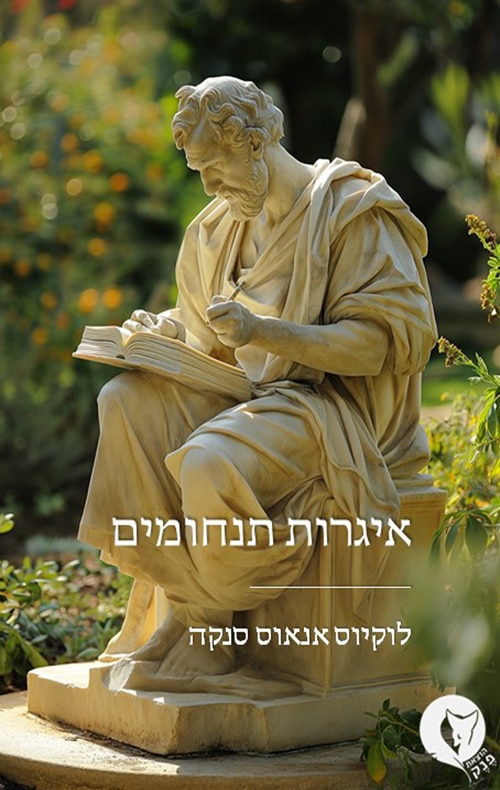Please scroll down for an English review.
קיבוץ של שלוש יצירות העוסקות באיגרות נחמה שכתב סנקה: הראשונה לאימו, הלוויה. השניה לפוליביוס והשלישית למרציה.
למרות שמדובר לכאורה במכתבים אישיים מאוד, סיגנון הכתיבה מאוד עיוני ומנותק וחלקים בהם לא מנחמים. אין בהם את המגע האישי והחיבור האישי והן מאוד מנותקות.
האיגרת הראשונה, לאימו הלוויה, ניסיון לנחמה על גלותו. ניתן לקרוא את האיגרת בפרויקט בן יהודה (קליק). סנקה הואשם בניאוף עם אחותו של הקיסר והוגלה לקורסיקה. הגלות נמשכה 8 שנים ומהמכתב עולה שהוא התייחס אליה כאל שינוי מבורך וכשינוי מקום:
אני מתחיל בדבר זה, אשר מפני געגועיך עלי ינעם לך לשמוע ביותר: לי לא התרחשה רעה כלל. אם יצלח לי להוכיח לך זאת, על נקלה יתברר, שכל אלה הדברים המצערים אותי, לפי דעתך, אינם קשים לסבול כלל. ואם לא יצלח לי, שתוכחי מזה – הן אתעלה בפני עצמי, אם נשאר אני מאושר במצב כזה, שאחרים נעשים על־ידו אומללים.
באיגרת הוא מעניק לאימו עצות כיצד להתמודד עם היעדרותו. אבל כלל המכתב לא מעניק תחושת נחמה.
החלק ההזוי ביותר הוא שחרי כל הסבל שהיא סבלה בחייה (סבל רב כפי שהוא מפרט בחלק ב') הוא מציע לה את נחמת הטיפשים:
הרחיקי מעליך נהי ויללה וכל מה שהאשה מרעשת בו עולם כשמכאובה תוקף אותה. הן לשוא היו כל הרעות אשר סבלת, אם עוד לא למדת להיות אומללה!
האיגרת השניה מופנית לפוליביוס, ניסיון לנחמה על מות אחיו. ניתן לקרוא את האיגרת בפרויקט בן יהודה (קליק 2). באיגרת הזו הוא מפליג אל המציאות הבלתי נמנעת והמתחייבת. כל בני האדם נועדו למות, זהו חוק הטבע:
מי הוא בעל גבהות־רוח וגאוה נבערה כזו, שיעוז לעומת חוק ההכרח הטבעי ההוא, השם קץ אחד לכל, לדרוש שיוציא מן הכלל אותו לבדו ואת אשר לו, ומן החורבן המוכן לעולם כולו יציל איזה בית יחיד? לכן הנוחם היותר גדול הוא, שיחשוב אדם מה שקרה לו כדבר אשר סבלו הכל לפניו ועתידים הכל לסבול, ונראה לי כי מטעם זה עשה הטבע את הדברים היותר קשים למשותפים, כדי שיהיה השויון לנחמה על האכזריות.
גם האיגרת הזו לא מנחמת. היא פחות אישית ויותר בגדר הירהורים פילוסופים על מוות, אבל ושכול.
האיגרת האחרונה בקובץ היא תנחומים למרציה על מות בנה. ניתן לקרוא את האיגרת בפרויקט בן יהודה (קליק 3). גם האיגרת הזו לא מנחמת. היא פחות אישית ויותר בגדר הירהורים פילוסופים על מוות, אבל ושכול.
מרציה התאבלה על בנה במשך שלוש שנים. כמו באיגרת לפוליביוס, סנקה מנסה לשכנע את מרציה שהמוות של בנה, עד כמה שהוא טראגי, הוא דרך העולם. הנחמה שסנקה מציע למרציה עוברת דרך אימהות אחרות ששכלו את בינהן. ובמיוחד את האימרה השחוקה הזמן מרפא את הפצעים:
ועוד זאת אנחנו רואים: הדבר הטבעי אינו פוחת כשהוא נמשך, אבל את הצער מפיג הזמן. אם גם הרבה יתעקש ויום יום ימרוד ויתגעש כנגד התרופות שמזמינים לו, בכל זאת מתישה את כחו העת אשר זה דרכה להחליש כל תוקף. אף בך, מרציה, שולט עוד עצבון כביר וכאילו הגליד ונקרש, ואם אינו הומה עוד כמו בתחלה, אבל חזק וקשה־עורף הוא. אך הזמן צריך להפחיתו לאט לאט.
בקריאה עכשיווית הנחמות שמציע סנקה, אבסורדיות. רובן ניתוח שכלי בזמן שבו הרגש שולט. הן אינן מביעות אמפטיה או חמלה על מצבו הריגשי של הצד השני ולכן הן לא מייצרות בקורא את החמלה ואת הרגש. יש בהן חוכמה, אבל היא עיונית וככזה אני לא בטוחה שהאיגרות הללו יתאימו לקורא מודרני.
איגרות תנחומים/ לוקיוס אנאיוס סנקה
הוצאת פנק, 2024
דירוג SIVI –
איכות אודיו –

A collection of three works dealing with letters of consolation written by Seneca: the first to his mother, the Hlevia, the second to Polybius, and the third to Marcia.
Although the writing style of these seemingly personal letters is very theoretical and detached, they lack a personal touch, making them disconnected and not comforting.
Seneca was accused of having an affair with the emperor's sister, which resulted in his exile to Corsica. During his exile, he wrote a letter to his mother, Halevia, to console her. The letter in the Ben Yehuda project reveals that Seneca viewed his exile as a welcome change and an opportunity to relocate. The exile lasted for eight years.
In his letter, he advises his mother on handling his absence, but it fails to provide comfort.
The most unrealistic thing is that he gives her what's known as false comfort after all the pain she's experienced in her life (which he talks about in part 2).
The second letter is addressed to Polybius, an attempt to console him for his brother's death. You can read the letter in the Ben Yehuda project. In this letter, the author acknowledges the unavoidable reality of death. According to him, all humans are destined to die, as it is a law of nature.
This letter is less personal and more like a philosophical reflection on death, grief, and bereavement, which may not provide comfort.
The final part of the document is a message of sympathy to Marcia about her son's passing. This message is available on the Ben Yehuda project's website. Unlike typical condolence letters, it doesn't offer much comfort. Instead, it discusses the broader topics of death, sadness, and coping with loss in a more general and philosophical way.
Marcia grieved for her son for three years. As in the letter to Polybius, Seneca attempts to persuade Marcia that while her son's death is tragic, it is a natural part of life. Seneca offers Marcia comfort by referencing other mothers who have experienced a similar loss and by reminding her that time heals all wounds.
The consolation that Seneca offers seems absurd to the modern reader. Most of it involves analyzing one's thoughts at a time when emotions are in control. The writings do not express empathy or compassion for the reader's emotional state and, therefore, do not generate any compassionate emotions within them. While wisdom is present, it is primarily theoretical, so I am unsure if these letters would suit a modern-day reader.


תרגום בלתי קריא, אני חושש (דומה שהמתרגם תלמידו של אברהם ארואטי, כי סיגנונם נטול-החן דומה). כל הכבוד לך שצלחת.